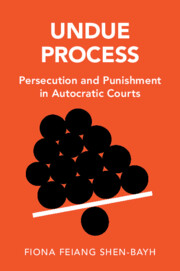6 - A Cooperative Judiciary
Published online by Cambridge University Press: 01 September 2022
Summary
This chapter unpacks questions of judicial compliance in autocratic regimes. On what basis can we assume that judges will dutifully execute the autocrat’s agenda? What can autocrats do to ensure that judges do cooperate? To answer these questions, I focus on the obstacles African autocrats confronted in the postcolonial period when they attempted to use courts for repressive ends as well as the strategies and tactics they used to overcome them. I find that postcolonial autocrats faced a trade-off in judicial design: Professionalizing the judiciary restricted who was eligible to serve on the bench. Facing a shortage of locally qualified jurists, autocrats instead recruited judges from abroad. Drawing on a variety of archival sources, I show that African and British officials worked together to expand the supply of judicial candidates across the British Commonwealth, which not only undermined the power of indigenous African judges but also helped cultivate more compliant courts.
Keywords
- Type
- Chapter
- Information
- Undue ProcessPersecution and Punishment in Autocratic Courts, pp. 152 - 191Publisher: Cambridge University PressPrint publication year: 2022

